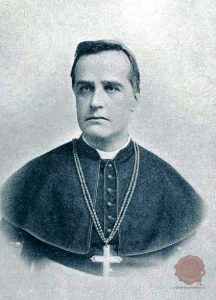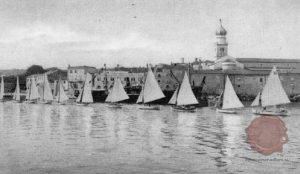
The restoration of constitutional life in the Austrian Monarchy at the beginning of the 1860s strengthened the tendencies of national awareness in the nations within the monarchy, which accelerated Slovenians’ national revival work; consequently, the gymnastic society Južni Sokol began operating in Ljubljana already in 1863.
The society was where the liberal Slovenians (the so-called mladoslovenci) and the conservative Slovenians (the so-called staroslovenci) co-operated harmoniously; similarly to other areas in Europe, the two groups formed ideologically opposite sides in the following years and created the rudiments of the first cultural clash in the Slovenian political space. The clash was the reflection of the changes taking place across all of Europe at that time, changes that accelerated the legislation of liberal ideas and spread at the expense of the former primacy of the Catholic Church, which found itself in a defensive position and gradually began an offensive against the modernisation of European society under the leadership of the popes.
Among Slovenians, this task was taken on by Anton Mahnič at the end of the 1880s, when the political situation was the most favourable for this; Mahnič demanded a renovation of the society in a Christian way and the uncompromising ideological separation into a Catholic and a liberal part. With his work, which spanned across several years, he slowly began changing the views of the Catholic side and played an important, if not even the deciding, role in the spiritual and political turn that encompassed all aspects of the society in Slovenian territory during the transition from the 19th to the 20th century. A real cultural clash had begun.
Among the first “victims” of Mahnič’s attacks on ideological opponents at the end of the 1880s was Sokol, which did come under the leadership of young liberal radicals in these years but was nonetheless more freethinking already from its beginning and was certainly not oriented against religion. Mahnič saw it as a harbinger of liberalism and thus began criticising it in his articles and opposing it openly; such actions were initially met with disapproval both on the liberal and the Catholic side, the latter of which was still a firm defender of Sokol. However, his ideas eventually found fertile ground, and consequently the changes in the attitude of the Catholic side soon began manifesting.

The changes culminated with the establishment of Orel, the Catholic version of the Sokol physical education organisation. Orel was established in 1906, a decade after Mahnič had already left the Slovenian territory; however, it can be said that Orel signifies the realisation of his ideas and aspirations.
*The article is a summary of an original article published in a journal Dileme, let. 3, št. 2, 2019.
